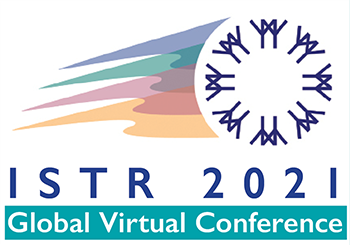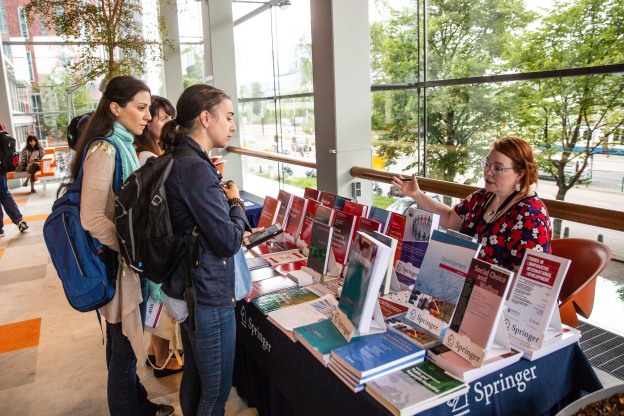Several awards were presented at ISTR’s 13th International Conference at Vrije Universiteit Amsterdam back in July and we would like to take this opportunity to tell you about the award winners.
Emerging Scholar Dissertation Award
This award, established in 2006 by an anonymous donor, is given once every two years at the biennial ISTR conference to the author of the best dissertation in the field of comparative study of civil society organizations, nonprofit organizations, philanthropy, and voluntarism and related issues. The purpose of the award is to encourage young scholars to enter the field of nonprofit and philanthropic studies throughout the world. The winner this year was chosen from among 60 other entries from 28 countries. The overall quality of the entries, the diversity of the topics approached, the scope of areas addressed, as well as the spectrum of research methods utilized, left a very positive impression with the members of this year’s Selection Committee.
This year’s winner is Andrew Heiss, Brigham Young University, for his PhD thesis Amicable Contempt: The Strategic Balance between Dictators and International NGOs.
 Examining the activities and adaption of international nongovernmental organisations (INGOs) in the context of increasing global restrictions on civic space, Andrew’s dissertation addresses the paradox that while INGOs’ service and advocacy activities can threaten the legitimacy and power of authoritarian regimes, numerous autocratic states still allow the work of INGOs; similarly, despite limitations and restrictions on their own activities, numerous INGOs continue to operate in these countries. Thus, the idea put forward and explored throughout the dissertation is that the relationship between INGOs and autocratic regimes is a state of amicable contempt: each party is aware that the other both threatens and supports their existence.
Examining the activities and adaption of international nongovernmental organisations (INGOs) in the context of increasing global restrictions on civic space, Andrew’s dissertation addresses the paradox that while INGOs’ service and advocacy activities can threaten the legitimacy and power of authoritarian regimes, numerous autocratic states still allow the work of INGOs; similarly, despite limitations and restrictions on their own activities, numerous INGOs continue to operate in these countries. Thus, the idea put forward and explored throughout the dissertation is that the relationship between INGOs and autocratic regimes is a state of amicable contempt: each party is aware that the other both threatens and supports their existence.
Focusing on the timeframe of 1991 to 2014, and on the three cases of Egypt, Russia and China, the dissertation addresses questions about: Why do regimes allow INGOs to work in their country? What influences INGO decision making in restrictive environments? How do regimes reap the benefits of INGOs programming? How do INGOs adapt to restrictions? A creative, detailed and thorough examination of an increasingly important international issue, the dissertation thereby provides a strong theoretical basis for examining INGO-dictator relationships. Additionally, it offers a diversity of practical findings that can be used by local and international NGOs to manage risk and to improve their likelihood of survival and impact of their work.
The Selection Committee also acknowledges the merit and achievements of the two other finalists.
Nora Derbal, Freie Universität Berlin, Charity for the Poor in Jeddah, Saudi Arabia, 1961–2015.
Sara Compion, University of Kentucky, Volunteering And Democratization In Southern Africa: A Structural And Cultural Analysis.
Best Articles in Voluntas 2016 & 2017
These articles will be open access and available to the public for August and September. Patricia Mendonca, University of Sao Paulo and chair of the awards committee, presented awards to:
- Abdulrazak Karriem, University of Western Cape Town, South Africa and Lehn M. Benjamin, Indiana University, United States, for their article, “How Civil Society Organizations Foster Insurgent Citizenship: Lessons from the Brazilian Landless Movement,” February 2016, Volume 27, Issue I, pp 19-36.
- Jasmin Slootjes, Vrije Universiteit Amsterdam, The Netherlands and Thomas Kampen, University for Humanistic Studies, The Netherlands for their article, “Is My Volunteer Job Not Real Work? The Experiences of Migrant Women with Finding Employment Through Volunteer Work,” October 2017, Volume 28, Isuue 5, pp 1900–1921.
Best Poster
Stefan Toepler, George Mason University, and Publications Committee Chair presented the award to Andre-Anne Parent; Stéphanie Tourillon-Gingras; and Christian Jetté, Université de Montréal for their poster The Entre-Maisons Ahuntsic – A Collaborative Project at the Hearth of Low-rent Housing Units. Click here to see the award-winning poster!
 “It is the task of the publications committee to select and confer the best poster presentation award. Doing so is a very delightful task; our only regret is that we cannot offer any publications opportunities along with the award. That said, in selecting our awardee, we look for both intellectual and visual appeal of the poster. Intellectually, we look for clearly presented statements of the research question and approach that also convince through concision. Visually, we like posters that utilize different design elements without being distracting and that easily guide the eye along … bonus points go to posters that manage to do so without overtaxing the eyes of the grey-haired crowd and do not force us to open the magnification app on our iPhones. There were many highly fascinating posters, but this one had the best overall package.”
“It is the task of the publications committee to select and confer the best poster presentation award. Doing so is a very delightful task; our only regret is that we cannot offer any publications opportunities along with the award. That said, in selecting our awardee, we look for both intellectual and visual appeal of the poster. Intellectually, we look for clearly presented statements of the research question and approach that also convince through concision. Visually, we like posters that utilize different design elements without being distracting and that easily guide the eye along … bonus points go to posters that manage to do so without overtaxing the eyes of the grey-haired crowd and do not force us to open the magnification app on our iPhones. There were many highly fascinating posters, but this one had the best overall package.”
PhD 3 Minute Thesis
 Ruth Phillips, University of Sydney in Australia and President-Elect of ISTR, presented the award for the PhD 3 Minute Thesis to Fanny Dethier for her presentation titled Seeing Through NPOs. A new innovation for ISTR, this experimental competition offered a light-hearted way for students in the ISTR PhD Seminar to practice the art of distilling their ideas down to the core questions and concerns in 3 minutes and 1 PowerPoint slide. Ten students all gave very good presentations during the seminar and the experience was fun for the audience. A prize was awarded to the person who made the case for their research in the most clear and compelling manner, and the winner made her presentation to the entire plenary. You can view a video of her presentation (at the end of the opening plenary) by clicking here.
Ruth Phillips, University of Sydney in Australia and President-Elect of ISTR, presented the award for the PhD 3 Minute Thesis to Fanny Dethier for her presentation titled Seeing Through NPOs. A new innovation for ISTR, this experimental competition offered a light-hearted way for students in the ISTR PhD Seminar to practice the art of distilling their ideas down to the core questions and concerns in 3 minutes and 1 PowerPoint slide. Ten students all gave very good presentations during the seminar and the experience was fun for the audience. A prize was awarded to the person who made the case for their research in the most clear and compelling manner, and the winner made her presentation to the entire plenary. You can view a video of her presentation (at the end of the opening plenary) by clicking here.
But besides the fun, the 3-minute thesis teaches important lessons – research should be designed to be useful, and in order to be useful (and in order to funded!) the users need to understand it and believe in it. Sometimes 3-minutes are all we have to get the attention of our audience.
It is ISTR’s hope that this competition provided an opportunity to make the wider conference attendees more aware of the PhD seminar, and hopefully inspired the students to feel more connected to the larger group of scholars and begin to see it as their research home into the future.
Congratulations to all the award winners!





 Examining the activities and adaption of international nongovernmental organisations (INGOs) in the context of increasing global restrictions on civic space, Andrew’s dissertation addresses the paradox that while INGOs’ service and advocacy activities can threaten the legitimacy and power of authoritarian regimes, numerous autocratic states still allow the work of INGOs; similarly, despite limitations and restrictions on their own activities, numerous INGOs continue to operate in these countries. Thus, the idea put forward and explored throughout the dissertation is that the relationship between INGOs and autocratic regimes is a state of amicable contempt: each party is aware that the other both threatens and supports their existence.
Examining the activities and adaption of international nongovernmental organisations (INGOs) in the context of increasing global restrictions on civic space, Andrew’s dissertation addresses the paradox that while INGOs’ service and advocacy activities can threaten the legitimacy and power of authoritarian regimes, numerous autocratic states still allow the work of INGOs; similarly, despite limitations and restrictions on their own activities, numerous INGOs continue to operate in these countries. Thus, the idea put forward and explored throughout the dissertation is that the relationship between INGOs and autocratic regimes is a state of amicable contempt: each party is aware that the other both threatens and supports their existence.

 “It is the task of the publications committee to select and confer the best poster presentation award. Doing so is a very delightful task; our only regret is that we cannot offer any publications opportunities along with the award. That said, in selecting our awardee, we look for both intellectual and visual appeal of the poster. Intellectually, we look for clearly presented statements of the research question and approach that also convince through concision. Visually, we like posters that utilize different design elements without being distracting and that easily guide the eye along … bonus points go to posters that manage to do so without overtaxing the eyes of the grey-haired crowd and do not force us to open the magnification app on our iPhones. There were many highly fascinating posters, but this one had the best overall package.”
“It is the task of the publications committee to select and confer the best poster presentation award. Doing so is a very delightful task; our only regret is that we cannot offer any publications opportunities along with the award. That said, in selecting our awardee, we look for both intellectual and visual appeal of the poster. Intellectually, we look for clearly presented statements of the research question and approach that also convince through concision. Visually, we like posters that utilize different design elements without being distracting and that easily guide the eye along … bonus points go to posters that manage to do so without overtaxing the eyes of the grey-haired crowd and do not force us to open the magnification app on our iPhones. There were many highly fascinating posters, but this one had the best overall package.” Ruth Phillips, University of Sydney in Australia and President-Elect of ISTR, presented the award for the PhD 3 Minute Thesis to Fanny Dethier for her presentation titled Seeing Through NPOs. A new innovation for ISTR, this experimental competition offered a light-hearted way for students in the ISTR
Ruth Phillips, University of Sydney in Australia and President-Elect of ISTR, presented the award for the PhD 3 Minute Thesis to Fanny Dethier for her presentation titled Seeing Through NPOs. A new innovation for ISTR, this experimental competition offered a light-hearted way for students in the ISTR 

 Participation principles notwithstanding, feedback mechanisms from intended beneficiaries on the relevance and quality of NGO work remained overshadowed by accountability to those providing resources. The
Participation principles notwithstanding, feedback mechanisms from intended beneficiaries on the relevance and quality of NGO work remained overshadowed by accountability to those providing resources. The  is Professor of Media and Communications, Goldsmiths, University of London where she is the co-director of Goldsmiths Leverhulme Media Research Centre and the Centre for the Study of Global Media and Democracy. She is also the research lead for
is Professor of Media and Communications, Goldsmiths, University of London where she is the co-director of Goldsmiths Leverhulme Media Research Centre and the Centre for the Study of Global Media and Democracy. She is also the research lead for  Shih-Jung Hsu is currently Professor of the Department of Land Economics at the National Chengchi University (NCCU), Taiwan, and is the Director of the Center for the Third Sector. Dr. Hsu’s research concentrates on local environmental movements, urban and rural planning, land use policy, and sustainable development in Taiwan. He was former president of the Taiwan Association of Third Sector Research (TATSR). He is also a leading activist in Taiwan, and he has established one important NGO — the
Shih-Jung Hsu is currently Professor of the Department of Land Economics at the National Chengchi University (NCCU), Taiwan, and is the Director of the Center for the Third Sector. Dr. Hsu’s research concentrates on local environmental movements, urban and rural planning, land use policy, and sustainable development in Taiwan. He was former president of the Taiwan Association of Third Sector Research (TATSR). He is also a leading activist in Taiwan, and he has established one important NGO — the 

















